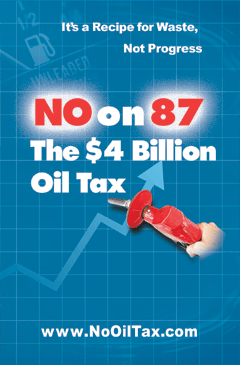Proposition 87
Air Date: Week of October 27, 2006
California voters will soon cast their ballots on Proposition 87, the high-profile initiative that has won the attention of the oil industry and environmental groups alike. The bill would tax oil drilled in California to directly fund renewable energy projects. Sacramento Bee reporter Laura MeCoy talks with Living on Earth about the initiative.
Transcript
CURWOOD: It’s Living on Earth. I’m Steve Curwood.
You can count on California to do things big, and this year’s election fight over a single measure is no exception. First of all, there is big campaign cash: 120 million dollars.
And then the big names, starting with Bill Clinton, Al Gore, Arnold Schwarzenegger, and plenty of Hollywood stars. And, of course, a big prize. In this case, four billion dollars to advance solar power and other kinds of renewable energy.
The big contest is over Proposition 87, which would generate those billions by slapping a tax on crude oil pumped out of the ground in California. Oil companies and their allies have already spent more than 80 million to fight the measure, mostly with ads:
[AD SOUND]
WOMAN: How’s our gas tank looking?
MAN: Um, oh, time to fill ‘er up.
WOMAN: Ouch.
MAN: Yeah and you better fasten your seatbelt because there’s an oil tax headed for the ballot.
WOMAN: You’ve gotta be kidding me.
MAN: I never kid about gas prices. It’s called Proposition 87, a four billion dollar tax.
[Fade out]
CURWOOD: The Hollywood-financed proponents of Prop 87 have spent about half of what the oil lobby has spent, but that’s still a whopping 40 million dollars.
[AD SOUND]
PRES. CLINTON: Proposition 87 will move California toward energy independence with cleaner fuels, with wind and solar power. Think of how you could change it all….”
[Fade out]
CURWOOD: Laura MeCoy is a reporter with the Sacramento Bee and she joins me now to discuss Prop 87. Hello, Laura.
MECOY: Hi, how are you today?
CURWOOD: Good. Tell me, what exactly is the goal of proposition 87?
MECOY: The goal of proposition 87 is to reduce petroleum usage in the state of California by 25 percent over 10 years.
CURWOOD: That’s a pretty ambitious goal. How exactly would the four billion dollars achieve that?
MECOY: Well, about 60 percent of the money would be used to reduce gasoline and diesel fuel usage in the state by financing alternative fuel vehicles and re-fueling stations. More than a fourth of it would go to California universities for alternative energy research. About 10 percent would be used to try to get energy-efficient technologies to the marketplace faster. Three-and-a-half percent would go for public education campaigns and administrative costs, and two-and-a-half percent would pay for vocational education at community colleges to develop a workforce in alternative energy technologies.
CURWOOD: So, what are the proponents arguing exactly?

California Proposition 87 proponent campaign logo.(Courtesy of: Yes on 87 Campaign)
CURWOOD: And if there’s a tax on the extraction of oil, obviously, sooner or later, consumers feel instinctively they would pay it. What do the proponents say to that?
MECOY: The proponents specifically wrote into the initiative that the tax that will be imposed on the extraction of oil in California could not be passed on to consumers. However, the legislative analyst, which is our sort of watchdog in the legislature, has said that would be difficult to enforce. And, as we all know, whenever we see gasoline prices go up, trying to parse out what is the cause of those prices going up is very difficult.
CURWOOD: Now, what do they opponents say here? How do they feel it will hurt Californians in the future?

California Proposition 87 opponent campaign logo.(Courtesy of: Californians Against Higher Taxes: No on the Oil Tax Initiative 2006 campaign.)
CURWOOD: Now, as I understand it, California is--what, like the third largest producer of oil in the United States?
MECOY: That’s correct.
CURWOOD: What about the other states? What do they have in the way of an extraction tax and how does that compare to the present extraction tax in California?
MECOY: We have virtually no extraction tax in California. There’s a tiny regulatory fee attached to oil that’s miniscule in comparison to what’s done in other states. Every other major oil-producing state does have a severance tax, and, in fact, in Alaska, as you probably are aware, they produce so much oil and they have such a large income from that tax that they don’t have state income taxes. So we are unique in that regard, and that is why the proponents of this initiative chose to go with an extraction tax. And when they first started the campaign, much of their campaign was about making oil companies pay their fair share, was what their ads were saying.
CURWOOD: So, from your reporting, Laura, what do you see as the economic impact in California likely to be, and how might that affect the nation?
MECOY: I think that the goal of the proponents is to try to nudge the entire country towards more alternative energy, that California would once again be a trendsetter.
CURWOOD: Now, as I understand it, over 100 million dollars has been poured into this election campaign. Why is so much being spent here campaigning on the proposition?
MECOY: The primary reason that it is so expensive, or so much money is being spent, is because both sides have very deep pockets. On the “no on 87” side, you have the oil companies, and they have dumped most of the 80 million dollars into that campaign. On the “yes” side, you have venture capitalists, and a Hollywood producer, and real estate heir, Steven Bing. He has put about 43 million dollars into the campaign in favor of Prop 87.
CURWOOD: Lets talk about some of the personalities here, particularly the politicians. Now, we’ve seen former President Bill Clinton campaigning in California on this, former Vice President Al Gore campaigning in California. Both of these men, Democrats, both in favor of this proposition. What about your governor, Arnold Schwarzenegger? Now, he’s a Republican running for re-election. What do we hear from him on this issue?
MECOY: He is opposed to the measure. But he came out against it very, very early in the process, and has been relatively silent since then. He’s opposed to the measure because it has a tax increase in it, and he has vehemently opposed tax increases. But he says he does support the goals of the initiative, and that if it is approved by the voters, he will work aggressively to implement it. I think he’s trying to keep faith with his Republican voters by opposing the tax increase, but he is clearly not opposed to the goals. So I think there is a strategy in his being relatively silent about the measure.
CURWOOD: Now, from your analysis, what would need to happen in the electorate for this to pass on November 7th?
MECOY: I think people are going to have to be convinced that this is really going to make a difference. But I have to say the supporters are pulling out all the stops. Bringing in Clinton and Gore is a very smart strategy, and I think that the proponents need this push. They’re declining in the polls. They were at 52 percent in August, and in September their support had dropped to 44 percent in the field poll.
CURWOOD: Laura MeCoy is a reporter for the Sacramento Bee. Thank you, Laura, so much.
MECOY: Thank you.
Links
Yes on 87, Californians for Clean Energy
Californians Against Higher Taxes: No on the Oil Tax Initiative 2006
Living on Earth wants to hear from you!
Living on Earth
62 Calef Highway, Suite 212
Lee, NH 03861
Telephone: 617-287-4121
E-mail: comments@loe.org
Newsletter [Click here]
Donate to Living on Earth!
Living on Earth is an independent media program and relies entirely on contributions from listeners and institutions supporting public service. Please donate now to preserve an independent environmental voice.
NewsletterLiving on Earth offers a weekly delivery of the show's rundown to your mailbox. Sign up for our newsletter today!
 Sailors For The Sea: Be the change you want to sea.
Sailors For The Sea: Be the change you want to sea.
 The Grantham Foundation for the Protection of the Environment: Committed to protecting and improving the health of the global environment.
The Grantham Foundation for the Protection of the Environment: Committed to protecting and improving the health of the global environment.
 Contribute to Living on Earth and receive, as our gift to you, an archival print of one of Mark Seth Lender's extraordinary wildlife photographs. Follow the link to see Mark's current collection of photographs.
Contribute to Living on Earth and receive, as our gift to you, an archival print of one of Mark Seth Lender's extraordinary wildlife photographs. Follow the link to see Mark's current collection of photographs.
 Buy a signed copy of Mark Seth Lender's book Smeagull the Seagull & support Living on Earth
Buy a signed copy of Mark Seth Lender's book Smeagull the Seagull & support Living on Earth

